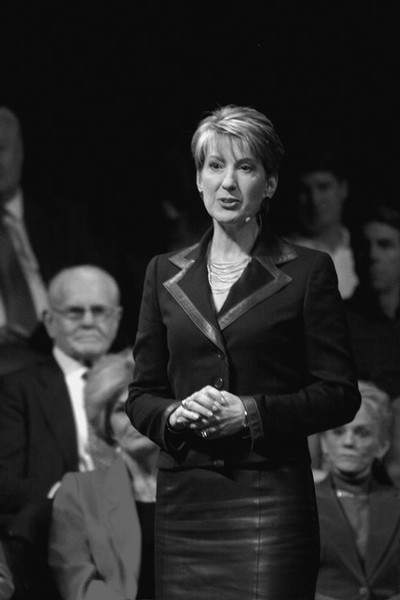
Former Hewlett-Packard CEO lectures (Photo by Austin Kilgore, The Daily Campus)
Marking the annual midpoint at the 2005-2006 Distinguished Tate Lecture Series Tuesday night, former chairman and CEO of Hewlett-Packard Co. Carly Fiorina gave a three-part explanation on what a leader must have to reach success in the 21st century.
According to Fiorina, an emerging leader today must know the power of education, the dynamics of globalization and an interconnected economy, and the importance of horizontal collaboration on every level.
Prefacing her speech, Fiorina revisited one strong value her parents instilled and reared her with during childhood: education.
According to Fiorina, her parents encouraged her to take risks and challenge herself.
“Never do I remember feeling my parents expected less of me because I was a girl,” she said.
Fiorina said she learned leadership through her educational experiences.
Leadership is about having a global perspective, challenging others and captivating hearts, authenticity, but most of all, she said, leadership is about knowing who you are and what you believe in.
“This is a new world,” she said, leading into an anecdote about her visit to Shanghai University in China.
According to Fiorina, students at the university spoke “perfect English,” had their eyes fixed on the “American dream” and were eager for “their shot at the world.”
Fiorina said she worries America doesn’t have the same ambition and passion to compete with our counterparts in globalization.
“But I am an optimist and America will rise to the challenge,” Fiorina said, adding that raising the educational bar in this country is an integral part of advancing.
Looking ahead, Fiorina said she believes technology will become an empowering tool “unlike anything we have seen before.”
In closing, Fiorna offered advice: “Do not underestimate the power of the basic things, the simple example. It is demonstrated by how people live and what they believe.”
Keeping with the Tate’s format, she opened the floor to her audience members, listening to questions and providing answers.
Anticipating the infamous question concerning her opinion on the board’s decision to oust her as CEO of Hewlett-Packard, Fiorina joked, “It took until a second question?”
She said she worked for Hewlett-Packard for six years because she loved the company and believedin its mission, but that sometimes unexpected things happen.
“The board and I had a disagreement,” she said. “And I don’t think a Board should manage a company. That’s the role of management.”
Fiorina reiterated she felt a lack of trust when members of the board disclosed private conversations with the media.
“I have no regrets,” she said. “I think I did the best things for the company I could given my ability and I didn’t sell my soul in the process.”








